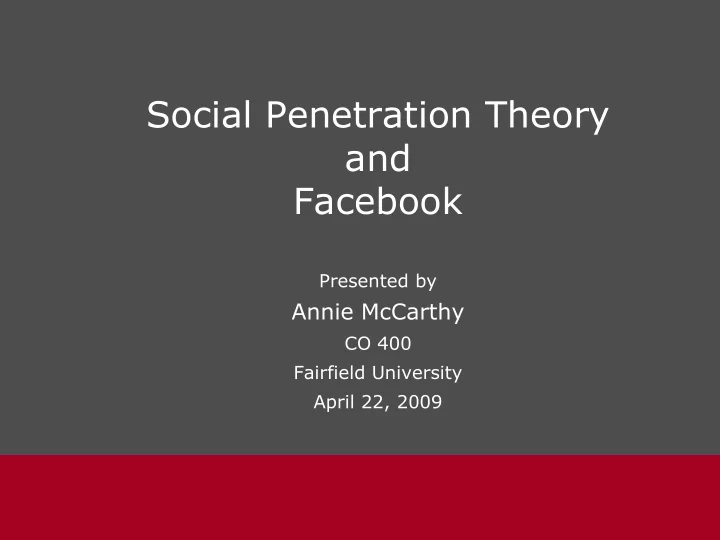

Social Penetration Theory and Facebook Presented by Annie McCarthy CO 400 Fairfield University April 22, 2009
Social Networking in Plain English tinyurl.com/socnetworkplain or youtube.com/watch?v=6a_KF7TYKVc
Relationships from networks • Users form relationships with each other in social networking online groups • Relationships can be symmetrical which is influence balanced; or asymmetrical, where one party has more influence than the other • Networks are dynamic, and are in a constant state of emergence, growth, maintenance and decline. • Relationships are caused by interactions and mutual understandings. Relationships are both social and personal, each side is constantly updating, thinking, • communicating, etc., until one discovers what the relationships means, or an affirmation occurs. • One’s perception is not necessarily true of another’s in any given relationship. In my research I found that relationships can be compared to games and relationships • are evaluated in a process, reconsidered, and the thought process leads to thinking about the future of the relationship. • Social networks and relationships can also be seen as a pattern of behavior
Social Penetration Theory (SPT) • Formulated by psychology professors Irwin Altman and Dalmas Taylor in 1973, to describe the dynamics of relational closeness – Relational closeness can progress from superficial to intimate. Closeness develops through self-disclosure. • Closeness varies according to the following factors: Rewards/benefits; Costs/vulnerability; Satisfaction; Stability and security • Self-Disclosure Characteristics – The story always represents the storyteller (the person disclosing). SD stimulates feedback. The quality of the feedback is related to the amount and relevance of self-disclosure we receive and share with others. Self-disclosure can be very revealing or not revealing. • Self-Disclosure Definitions – Jourard (1971) defines self-disclosure as making ourselves "transparent" to others through our communication--i.e., when we tell others things about ourselves which help them to see our uniqueness as a human being. – Other definitions I found described the difference between self-description vs. self-disclosure. Self- description involves communication that levels "public layers" whereas self-disclosure involves communication that reveals more private, sensitive, and confidential information. – Pearce & Sharp (1973) make an interesting distinction among three related terms: Self-disclosure, confession, and revelation. • Self-disclosure – voluntarily communication of information about one's self to another. • Confession – forced or coerced communication of information about one's self to another. • Revelation – unintentional or inadvertent communication of information about one's self to another.
Nielsen top 10 parent sites- Feb. 2009 Parent Unique Audience (000) Time Per Person (hh:mm:ss) 1. Google 133,983 2:00:55 2. Microsoft 125,692 2:28:15 3. Yahoo! 114,130 3:27:19 4. AOL LLC 83,083 3:45:59 5. News Corp. Online 77,569 1:21:13 6. Facebook 65,704 2:59:54 7. InterActiveCorp 65,693 0:16:17 8. eBay 63,066 1:51:13 9. Amazon 59,389 0:24:33 10. Wikimedia Foundation 57,910 0:17:10 Source: http://en-us.nielsen.com/main/news/news_releases/2009/march/nielsen_online_provides
Popular SNS rankings- Alexa Source: http://www.alexa.com/siteinfo/facebook.com+myspace.com+twitter.com
What is Facebook? Source: http://www.facebook.com
Facebook Statistics Source: http://www.facebook.com/facebook?ref=pf
Source: http://jeffreyhill.typepad.com/.a/6a00d8341d417153ef0105362c512a970c-800wi
Future growth and other findings Findings of Self Disclosure Research • Disclosure increases with increased relational intimacy. • Disclosure increases with the need to reduce uncertainty in a relationship. • Disclosure tends to be reciprocal. • Disclosure tends to be incremental. • Disclosure tends to be symmetrical. • Liking is related to positive disclosure, but not to negative ones. • Positive disclosure does not necessarily increase with the intimacy of the relationship; but negative disclosure is directly related to the intimacy of the relationship. • Relational satisfaction and disclosure have a curvilinear relationship -- satisfaction is highest with moderate levels of disclosure. • By using Facebook and other social networking sites you grow relationships using self-disclosure.
Privacy concerns • Virtual communities can bring users closer together to form relationships, and users are seemingly not concerned with privacy, but want to feel connected and make new “friends.” Facebook users have tools available to protect their privacy, as users can restrict the accessibility of their profiles using a variety of means, particularly by restricting full profile viewing to their Facebook “friends” or friends of friends and networks. • Social networking site users, especially college students in the U.S., have high connectivity levels, therefore offline identities carry over to online behavior, and vice versa. This can be seen today with users constantly updating their status on Facebook or Twitter, or RSVPing to event invitations on Facebook. • We love to share, it is part of human interaction, and on social networking sites its fun and easy to do. What you share with “friends”, who could be real friends, acquaintances, co -workers, or strangers, could potentially be for all to see globally. Websites do allow privacy settings and users are increasingly changing their privacy settings, or not posting content that could be potentially damaging to them, socially, or in the workplace if a friend on a social networking site like Facebook is their boss. \ • Although it may be common sense, a good rule of thumb is to not friend your boss or other people that could take offense to what you and your friends may be posting to your profile(s). • Content on the internet never goes away; anything you say can and will be used against you. • If you write something it’s out there, and that’s great if you want it to be, but you also need to be careful because everyone has access to it. • Just Google yourself, or search pipl.com, and see what you find. If you’re ok with what you find then you’re on the right track.
Thank You!
Recommend
More recommend